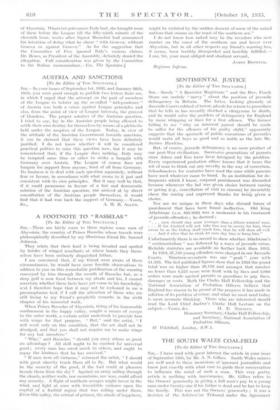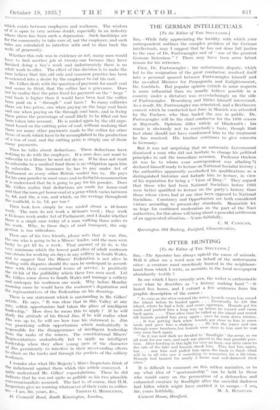THE SOUTH WALES COAL-FIELD
[To the Editor of DIE SPECTATOR.] SIR,—I have read with great interest the article in your issue of September 18th, by Mr. A. N. Gilkes. South Wales miners are well used to these incursions of ignorant journalists and know just exactly with what care to guide their conversation to influence the mind of such a man. This very pretty article is seething with inaccuracies. Mr. Gilkes refers to the Owners' generosity in giving a full man's pay to. a young man under twenty-one if his father is dead ,and he has to keep the family. This was not the Owners' generosity ; it was a decision of the Arbitration Tribunal under the Agreement
Which exists between employers and workmen. The wisdoM of it is open to very serious doubt, especially in an industry Where there has been such a dePression. Such hardships are for the community to take care of, not the employer, and such rules are calculated to interfere with and to dam back the Wells of generosity.
Whether this ride was in existence or not, many men would have to find another job at twenty-one because they have finished doing a boy's work and unfortunately there' is no adult work to offer. The effect of this decision is to make the 'Tien believe that this old rule and common practice has been re-oriented into a desire by the employer to cut his cost.
Mr. Gilkes deals with the question of payment for small coal and seems to think that the collier has a grievance. Does not he realise that the price fixed for payment on the " large " coal basis is higher than it would have been had the collier been paid on a " through" coal basis ? In many collieries there are two prices, one when paying on the large coal basis and one when paying on the through coal basis, and in fixing these prices the percentage of small likely to be filled out has been taken into account. He is misled again by the old argu- 'neat based on the cutting price of coal, without realising that there are many other payments made to the collier for other items of work which have to be accomplished in the production of a ton of coal, and the cutting price is simply one of those many payments.
Then he talks about deductions. These deductions have nothing to do with the employer. If a man does not want to subscribe to a library he need not do so. If he does not want to subscribe to a medical fund there is no obligation upon him to subscribe. The insurance he has to pay under Act of Parliament as every other British worker has to. He pays for his own powder in most eases and in fixing his remuneration. h is understood that he is going to pay for his powder. Does Mr. Gilkes realise that deductions are made for house-coal, and that the men get house-coal at a price which varies between
Gd. and 10s. a ton, and which, on the average throughout the coalfield, is 5s. 7d. per ton
Then look how simply he was misled about a 48-hours The men do not 'Work 'a 48-hours week ; they work a 45-hours week under Act of Parliament, and I doubt whether there is a single case today of a man walking three miles to his work. Why, in .these days of road transport, the sug- gestion is too ridiculous.
Then one of his two friends, please note that it was Jim,. the one who is going to be a Miners' leader, said the men were lucky to get £2 Gs. a week. That amount of £2 6s. is the N'ery minimum which the lowest paid class of adult workman can obtain for working six days in any colliery in South Wales, and to suggest that the Miners' Federation is not alive in, dealing with disputes should the men be underpaid in accord- ance with their contractual terms of service, is positively the tit-bit of the gullibility which these two men. used. Let kr. Gilkes come down to South Wales and manage a colliery and underpay his workmen one week. Why before Monday morning came he would have the workmen's deputation and the representatives of the Federation on his doorstep.
There is one statement which is outstanding in Mr. Gilkes' article. He says, " It was clear that in this Valley at any i,ve, selfish opportunism had taken the place of intelligent leadership." How does he mean this to apply ? If he will study the attitude of his friend Jim, if he will realise what Jim was up to, he will see how true his statement is. Jim was practising selfish opportunism which. undoubtedly is responsible for the disappearance of intelligent leadership Representatives the ranks of the miners. The constitutional Miners' 4tepresentatives undoubtedly fail to apply an intelligent Leadership when they allow young men of the character of Jim persistently to interfere in their never-ending efforts to climb on the backs and through the pockets of the colliery Itarkmen. '
I Wonder also what His Majesty's Mimics Inspectors think of the indictment against them which this article conveyed. I !lade understand Mr. Gilkes' expostulations. There he did indicate that he was not quite so gullible as his two plausible
Inspectors assumed. The fact is, of course, that H.M.
inspectors give no warning whatSoever of their visits to collier-
41 Cromwell Road, South Kensington, London,



























































 Previous page
Previous page